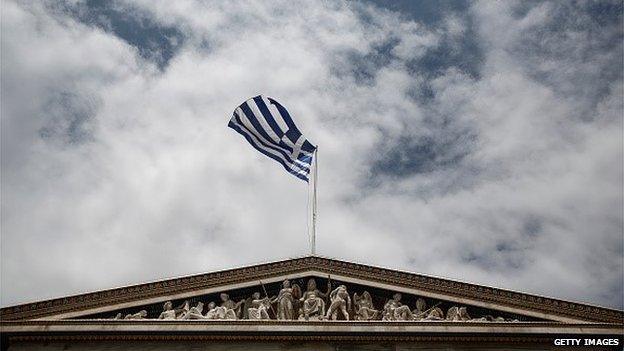How damaged is eurozone and EU by Greek debacle?
- Published
- comments

Over the weekend, the director of one of the world's biggest drug companies told me that this company had given up expecting to be paid by Greece for the life-saving pharmaceuticals it makes.
But for those dependent on its cancer and other treatments to stay alive, for example, it would not stop supplying them - though now for free. It could not and would not pass a death sentence by withholding medicines.
But whether any new cancer sufferers - those not diagnosed till today - would be able to obtain these treatments, now that's another question. I asked and my answer was a shrug and sheepish look.
That brings home to me the magnitude of what is happening in Greece.
We simply haven't seen since the 1930s a rich developed country collapse as Greece is doing right now - millions of people threatened with losing their life savings, companies on the point of collapse, cancer sufferers unsure what treatments, if any, will be available to them.
Now to most outsiders, this demarche is in part the consequence of the incompetence and greed of a succession of Greek governments, and the negligence, incompetence and political insensitivity of the rest of the eurozone and the International Monetary Fund.
In other words, debtor and creditors are both to blame, arguably in equal measure.
So what is particularly horrifying to dispassionate observers is the perception that most of the eurozone, and especially Germany, is hell-bent on making an example of Athens, humiliating the government of Alexis Tsipras, as the price of a financial rescue that - in a best case - will continue to make Greeks poorer, though not as poor as leaving the euro would do.
The unappealing facts are these.
On Friday, Mr Tsipras capitulated - and accepted tax rises, pension cuts and economic reforms that his creditors had been demanding and which the Greek people overwhelmingly rejected in a referendum a few days earlier.
But rather than using Mr Tsipras's personally painful climbdown - which involved forming an entente with hated opposition parties and splitting his own party - as a basis for consensual discussions on a sustainable bailout, Eurogroup finance ministers, led by Germany's Wolfgang Schaeuble, denigrated it as too little, too late.
Instead, Mr Schaeuble tried to bundle Athens towards a door no one thought existed, since the euro is supposed to be forever - the one marked "temporary exit".
This so terrified Mr Tsipras that he has since, in the Eurogroup meeting and an all-night meeting of eurozone government heads - which at the time of writing is still continuing - allowed himself into negotiations that, if successful, would rob Greece of all meaningful economic sovereignty.
Tax, spending, privatisations and the structure of industries - the stuff that shapes lives - would be determined by emergency legislation rushed through the Greek parliament by Wednesday, with no opportunity for serious debate.
Is that democracy?
Only if an entire parliament demonstrably surrenders by the middle of this week would the rest of the eurozone start talks on possibly extending the additional €86bn of finance Greece needs to prevent future default and the total collapse of its banking system.
And for what it's worth, the presumption among other eurozone leaders that Mr Tsipras is willing and able to deliver the abject obeisance of Athens lawmakers may turn out to be naive.
Here in Athens, all I detect from government members, bankers and others is fatalism that they're ruined, more or less whatever happens - which makes their behaviour unpredictable.
There would in effect be a takeover, for years, of Greece by Berlin, Brussels and the IMF in Washington.
Monitors, from the IMF, would be permanently stationed in Athens, to prevent backsliding by the administration.
Privatisation proceeds would be put into some kind of escrow account, possibly in Luxembourg.
Athens would be deprived of even a figleaf of national economic autonomy.
Now it is perfectly plausible to argue that Mr Tsipras and his colleagues have brought this upon themselves by their incompetence - especially in their negotiations with the rest of the eurozone - since being elected at the turn of the year.
But if the eurozone and EU stands for anything, it is solidarity between member nations.
The widespread perception that Berlin and Brussels have put fiscal rectitude, the importance of a country paying its debts, above humanitarian concern for a nation's plight, or even the long-term sustainability of the euro itself, will reap a bitter future harvest for eurozone and the wider EU.
Will the eurozone's marginalisation of Greece make it harder or easier for David Cameron to sell continued membership of the EU to the people of the UK?
Will the offer by Mr Schaeuble of temporary leave of absence for Greece from the euro make it harder or easier for Brussels, Berlin and the European Central Bank in Frankfurt to quell the growing doubts of investors - who fund all important economic activity - that the euro is the permanent enterprise it claims to be?
Will the rise and rise of populist anti-EU parties all over Europe be staunched or encouraged by reports that an EU official described Mr Tsipras's treatment by other EU leaders as the equivalent of "waterboarding"?
The eurozone crisis began in Greece in 2010. It threatens to degenerate into an existential crisis for the wider EU.